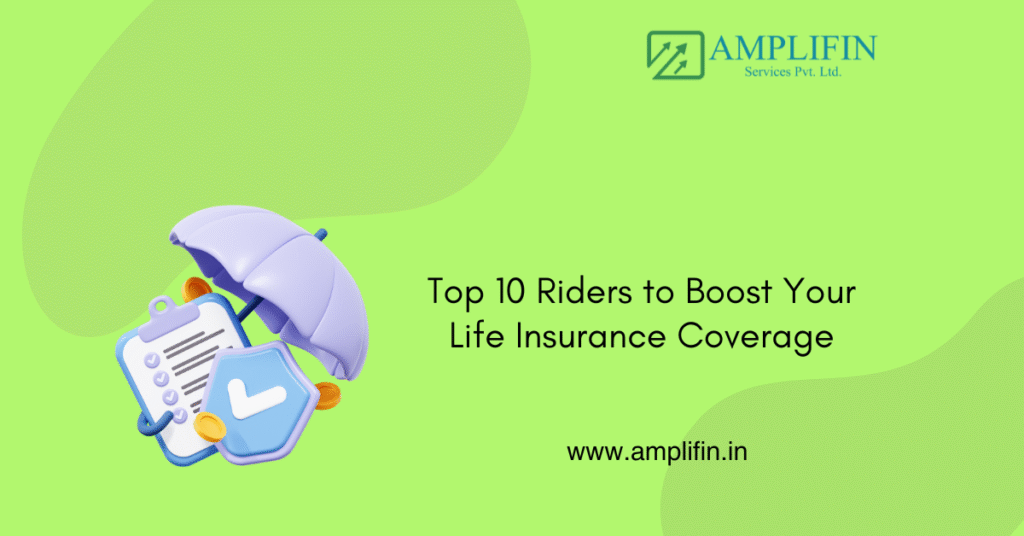Unlocking the Power of Riders in Life Insurance: Why Every Policyholder Should Care
Want more from your life insurance than just a payout? Discover how the right insurance rider can transform your term insurance into a personalized safety net.
When you think of term insurance or any life insurance plan, you likely imagine a basic policy that offers financial protection in case of death. But what if you could enhance your insurance coverage without overhauling your entire plan? That’s exactly what an insurance rider does. A life insurance rider is an add-on feature that helps you tailor your policy according to your needs — whether it’s coverage for critical illness, accidental death, or even disability.
This article is a comprehensive guide to the significance of riders in life insurance. We’ll break down the common life insurance riders, why they matter, and how to choose the best ones based on your goals and life stage. Read on to discover how these simple add-ons can offer extraordinary protection.

Article Outline
- What Is an Insurance Rider and Why Does It Matter?
- Understanding a Life Insurance Rider: The Basics
- Types of Life Insurance Riders You Should Know
- The Role of Riders in Term Insurance Plans
- Accidental Death Rider: A Safety Net Beyond Basic Coverage
- Waiver of Premium Rider: Protection When You Can’t Pay
- Critical Illness Rider: A Must-Have in Today’s World
- Accelerated Death Benefit Rider: Financial Relief When It’s Needed Most
- Term Rider: Add Coverage Without a New Policy
- Choosing the Right Rider for Your Insurance Plan
- How Riders Enhance Your Base Policy
- Are Riders Worth the Extra Premium?
- Riders in Life Insurance: Key Benefits You Can Add
- How Insurance Companies Treat Riders
- Final Thoughts: Do You Need Riders in a Life Insurance Plan?
1. What Is an Insurance Rider and Why Does It Matter?
An insurance rider is a provision you can add to your standard life insurance policy to expand or enhance the coverage. While a typical term insurance policy focuses on providing a death benefit, riders offer additional coverage for specific situations — such as accidental death, critical illness, or disability.
You can think of a rider as a customization feature in your insurance plan — just like personalizing a car with premium safety features. Most life insurance companies provide riders that can be added by paying an additional premium. These riders are optional, and selecting the right ones can significantly elevate your policy’s value.
2. Understanding a Life Insurance Rider: The Basics
A life insurance rider is designed to add more utility to your life insurance policy. It ensures that you or your family are protected against various unforeseen events that might otherwise not be covered under the base policy.
For example, if you have a critical illness rider, you might receive a lump sum if diagnosed with a life-threatening illness — even if your main policy is still active. A rider in insurance doesn’t replace your policy; it complements it, often with a nominal extra premium.
3. Types of Life Insurance Riders You Should Know
There are many types of life insurance riders, each catering to different needs:
- Accidental Death Rider
- Waiver of Premium Rider
- Critical Illness Rider
- Accelerated Death Benefit Rider
- Term Rider
- Disability Rider
- Income Benefit Rider
These riders are additional benefits you can add to your existing insurance plan as per your lifestyle, health condition, and risk tolerance. Many life insurance policies allow one or more essential riders to be clubbed for complete protection.
4. The Role of Riders in Term Insurance Plans
Term insurance plans offer affordability and simplicity, but they often lack comprehensive coverage. This is where riders in a life insurance policy come in handy.
Riders can help enhance your policy by offering protection against accidental death, income loss, or critical illness. By paying an additional premium, you can enjoy wider protection without the need for a second or third insurance policy.
5. Accidental Death Rider: A Safety Net Beyond Basic Coverage
The accidental death rider or accidental death benefit rider is one of the most popular add-ons. If the policyholder dies due to an accident, this rider pays an extra lump sum over and above the standard death benefit.
This type of insurance rider ensures your family receives extra financial support when it’s needed most. In a country like India where accidental death cases are high, this rider in insurance is a must-have.
6. Waiver of Premium Rider: Protection When You Can’t Pay
A waiver of premium rider is designed for those moments when you’re unable to continue paying your insurance premiums due to disability or job loss.
This rider allows your policy to stay active even if you’re not paying the premium — effectively giving you coverage without financial burden. It’s particularly useful for breadwinners and self-employed individuals who can’t afford a lapse in coverage.
7. Critical Illness Rider: A Must-Have in Today’s World
Healthcare costs are skyrocketing. A critical illness rider offers a lump sum payout if you’re diagnosed with illnesses like cancer, heart attack, or kidney failure.
This rider provides the financial support required for treatments, travel, and recovery — all without touching your savings. For many, it’s the bridge between illness and insolvency.
Adding a critical illness rider to your term insurance plan is a smart move for those with a family history of severe health conditions.
8. Accelerated Death Benefit Rider: Financial Relief When It’s Needed Most
This insurance rider allows early access to the death benefit if you’re diagnosed with a terminal illness. The accelerated death benefit rider helps cover medical and hospice care, giving you and your family peace of mind.
Unlike a standard payout after death, this rider covers costs while you’re still alive, easing financial strain during an emotionally difficult time.
9. Term Rider: Add Coverage Without a New Policy
A term rider is essentially an additional term life insurance cover added to your base policy. It allows you to increase your life insurance coverage temporarily — for example, during a period when you have a mortgage or young children.
You can add a rider to increase the policy coverage for a fixed policy term, paying only a slightly higher premium. It’s an excellent option for people who want extra coverage during financially risky periods.
10. Choosing the Right Rider for Your Insurance Plan
When choosing a rider in insurance, always assess your lifestyle, occupation, family history, and future responsibilities. For instance:
- If you travel frequently, an accidental death rider makes sense.
- If you’re self-employed, a waiver of premium rider may be critical.
- Concerned about healthcare? A critical illness rider is non-negotiable.
Talk to your insurance advisor to help you select an insurance plan as per your unique needs.
11. How Riders Enhance Your Base Policy
Riders to enhance your policy work by expanding the scope of your basic life insurance policy. They offer benefits you can add by simply opting in during policy purchase or renewal.
Whether it’s protecting against accidental death, loss of income, or terminal illness, riders ensure that your life insurance policy by paying a little more gives a lot more in return.
12. Are Riders Worth the Extra Premium?
You may wonder if paying an extra premium for riders is truly worth it. The short answer: absolutely — if chosen wisely.
Riders are not mandatory, but they’re one of the best tools for customising your policy. The premium paid for a rider is often significantly lower than the cost of a separate standalone policy for the same benefit.
Moreover, riders are eligible for tax deductions under Indian tax laws, giving you financial and fiscal benefits.
13. Riders in Life Insurance: Key Benefits You Can Add
Here are some key benefits of riders in a life insurance product:
- Protection against critical illness or accidental death
- Waiver of premium in case of disability
- Early access to death benefit for terminal illness
- Additional income benefit rider to support dependents
These riders can help you bridge the gap between your basic term insurance and comprehensive insurance coverage.
14. How Insurance Companies Treat Riders
Most insurance companies in India offer a wide range of life insurance riders available with their plans. However, the riders available may vary by insurer and policy type.
For instance, a whole life insurance policy may offer different rider options compared to a term life insurance plan. It’s important to compare offerings from different providers before choosing.
Some life insurance company limited providers even offer bundled rider packages for convenience, though customization is always better if your policy in India allows it.
15. Final Thoughts: Do You Need Riders in a Life Insurance Plan?
Absolutely. Riders are like strategic upgrades to your standard life insurance policy. Whether you’re planning long-term or just entering your 30s, the right combination of riders can make all the difference in how effectively your life cover protects your family.
When evaluating any insurance policy offers, don’t overlook the riders and what they cover. A well-selected rider ensures your insurance adapts to life’s uncertainties.
Key Takeaways
- An insurance rider is an optional add-on to a base life insurance policy that enhances coverage.
- Common riders include accidental death rider, critical illness rider, waiver of premium rider, and accelerated death benefit rider.
- Term insurance plans benefit greatly from appropriate riders, offering broader insurance coverage at a marginal additional premium.
- Riders can help you customise your policy without the need for multiple insurance products.
- Consult your insurance advisor to choose the best riders available based on your needs.
- Riders are not mandatory but are highly recommended for comprehensive protection.
- Adding riders to your policy can be more cost-effective than buying separate insurance.
- Many life insurance riders are eligible for tax benefits under applicable Indian tax laws.
- Evaluate riders carefully when buying or renewing any term insurance policy or whole life insurance product.
